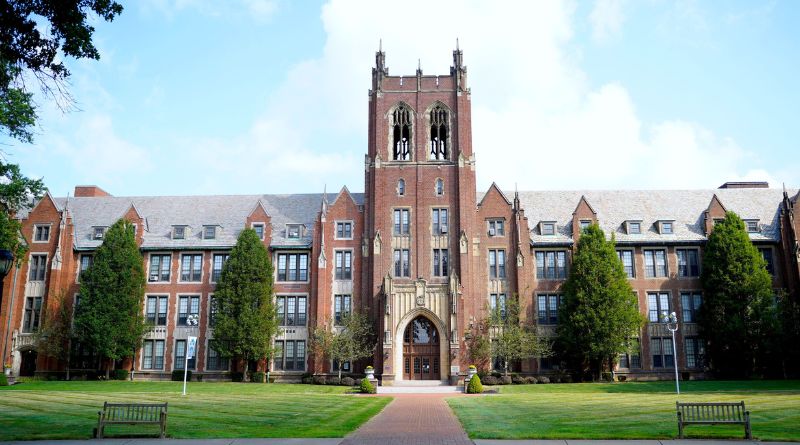
In a surprising and heartbreaking announcement, Notre Dame College, a prominent institution in the field of higher education, is set to close its doors permanently. This closure has left many students, alumni, faculty, and local residents in shock as they process the impact it will have on the community. For decades, Notre Dame College has been an integral part of higher education, known for its commitment to academic excellence, community service, and fostering an inclusive, compassionate environment.
As the news unfolds, many are left wondering what led to the college’s closure, what will happen to the students currently enrolled, and what the broader implications are for the local area. This article provides an in-depth look at the situation, including its causes, effects, and frequently asked questions to help guide those affected by the decision.
Table of Contents
The Announcement: Why Is Notre Dame College Closing?
The closure of Notre Dame College comes after a series of challenges faced by the institution in recent years. While the specific reasons for the decision are multifaceted, the college has pointed to financial difficulties as a primary cause. Like many small liberal arts colleges across the country, Notre Dame College has struggled with decreasing enrollment, rising operating costs, and the increasing financial pressures that come with maintaining a high standard of education.
In a statement issued by the administration, officials noted that despite efforts to address these challenges through cost-cutting measures and fundraising initiatives, the college has been unable to achieve the financial stability necessary for its continued operation. Additionally, changing trends in higher education, such as the rise of online learning and shifting demands for certain academic programs, have played a role in the decline of enrollment numbers.
Impact on Students and Faculty
Students
For students currently enrolled at Notre Dame College, the news of the closure has undoubtedly created uncertainty about their educational future. The college administration has assured that it will work to ensure that students can complete their studies and earn their degrees. However, many students may be faced with the difficult decision of transferring to another institution to finish their education.
Students will be offered support through counseling services to navigate the transfer process, including help with applications, credit transfers, and connecting with other institutions. Some students may also be eligible for financial aid and assistance in finding new accommodations.
Faculty and Staff
Faculty and staff members at Notre Dame College will also be affected by the closure. While the college has expressed its commitment to supporting its employees during the transition, many faculty members may need to find new teaching positions or career paths. The closure will likely lead to job losses, and many employees are already in the process of seeking new opportunities.
What Happens Next?
For students, faculty, and the broader community, the closure of Notre Dame College raises many questions about what happens next. Here’s what we know:
- Transfer Process: Current students will be given priority when transferring to other nearby institutions. There may be opportunities for students to continue their education with minimal disruption, but each student’s situation will be unique. It is recommended that students start the transfer process as soon as possible to avoid delays.
- Financial Aid: Notre Dame College has pledged to assist students in maintaining their financial aid packages as they transition to other schools. This includes ensuring that scholarships and grants are transferred when possible. Students should reach out to the financial aid office for specific guidance.
- Alumni Community: Alumni of Notre Dame College have played an important role in the college’s history, and many are concerned about the legacy of the institution. The closure of the college may change the way alumni interact with the institution moving forward, but efforts will be made to keep the alumni community connected and engaged.
- Local Impact: The closure of Notre Dame College will have a significant effect on the local community, especially in terms of economic impact. The college employed hundreds of staff members and attracted students from outside the region. With the college no longer operational, local businesses, housing markets, and other services that relied on the college may experience a downturn. Efforts to mitigate this impact will likely be a focus for local leaders.
FAQs About Notre Dame College Closing
Q1: When will Notre Dame College officially close?
A1: The closure is set to take place by the end of the current academic year, with the final semester being completed in the spring.
Q2: Can students still graduate from Notre Dame College?
A2: Yes, students currently enrolled at Notre Dame College will be able to complete their degree programs, provided they meet graduation requirements. Those unable to do so will be assisted in transferring to another institution to finish their studies.
Q3: Will Notre Dame College offer any financial compensation for students transferring?
A3: The college has committed to helping students with the transfer process, including financial aid transfers where possible. Students are encouraged to contact the financial aid office for personalized assistance.
Q4: What happens to the faculty and staff at Notre Dame College?
A4: Faculty and staff will be offered support in finding new employment. However, many will face job loss as a result of the closure. The college is working with various organizations to help staff find new opportunities.
Q5: How will this affect the surrounding community?
A5: The closure of the college will have a significant impact on the local economy, especially for businesses and services that have supported the college. Efforts will be made to address the economic consequences, but the full scope of the impact is still being evaluated.
Q6: Are there any plans for the campus after the closure?
A6: It is unclear at this time what will happen to the physical campus once the college closes. The administration has stated that it will explore potential future uses for the property, which could include selling or repurposing the facilities.
Conclusion
The closure of Notre Dame College marks the end of an era for the institution, its students, and the surrounding community. While the decision is undoubtedly difficult for all involved, the focus now must shift toward ensuring a smooth transition for students, faculty, and staff. The college’s legacy will live on through its alumni, and the impact it has had on countless lives will not be forgotten.
As the process unfolds, it is essential that all affected parties stay informed and make use of the resources and support available to them. Although the future is uncertain, with careful planning, many will be able to continue their educational journeys and make the best of a challenging situation.






